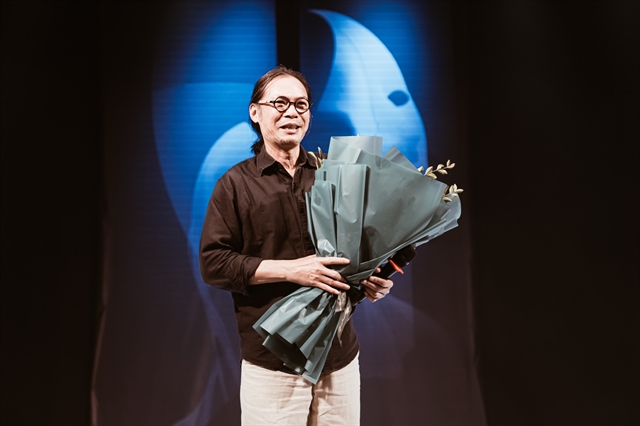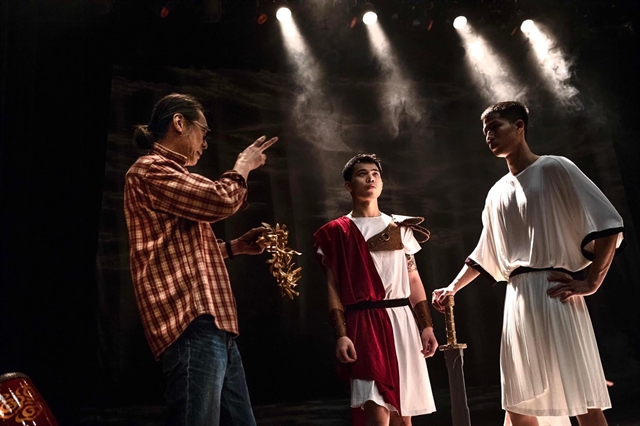Weather:
- Ha Noi 20oC
- Da Nang 21oC
- Ho Chi Minh 28oC
Trần Lực is a celebrated film director and actor with numerous well-known roles and cinematic works. After 20 years in the film industry, Lực returned to theatre through his establishment of LucTeam - the first private troupe in the North of Việt Nam.
Trần Khánh An caught up with Lực for a conversation about his troupe and his new theatrical approach – theatrical conventions and expressionism – to revive theatre in the North.

Inner Sanctum: Why have you suddenly returned to your family's profession - theatre - when you were halfway through your life in the film industry?
My love for theatre did not suddenly come, I had intended to establish a drama troupe since I was young.
As a child, because my family lived at the Mai Dịch art performance quarter, I was immersed in various Vietnamese classical forms of theatre such as chèo, tuồng and cải lương. I followed my parents – theatre director Trần Bảng and actress Trần Thị Xuân – to all chèo stages and learned multiple scripts of the folk drama genre by heart.
When I went home from studying abroad in 1991, I had to put my passion on hold for a while and turn to film acting and directing. In 2017, I finally established my own troupe named LucTeam.
Inner Sanctum: What do you think about the remark “Theatre in the North is dying”?
Theatre itself never passed away, only theatre practitioners remain unchanged. Today's audience easily access numerous sources of entertainment and art forms, even with just a smart phone. Yet, the North's theatre troupes from 50 years ago and now are exactly the same with no distinctiveness among them, boring the audience.
The North's theatres are still influenced by Soviet Russian [Constantin] Stanislavski's method and still follow psychological realism as a theatrical approach. However, when it comes to depicting the psychology of characters and creating lifelike settings, theatres cannot compare with film in enticing the audience. Drama troupes in northern Việt Nam also lack art directors and a distinctive approach, making it difficult for audiences to distinguish them from other troupes.
For me, art should shift with the movement of the present day and the audience. Theatrical art forms should be distinct from other art forms to enchant younger audiences. For drama troupes, they must find unique approaches and constantly reinvent themselves to thrive.
For LucTeam, our theatrical approach is conventions and expressionism.
Inner Sanctum: What are theatrical conventions and expressionism? Why do you choose them as your theatrical approach?
Theatrical conventions and expressionism are not a newborn approach. They have appeared in Eastern theatrical genres for centuries, even in chèo or tuồng. With sincerity and minimalism in staging, settings and storytelling of these approaches, drama troupes can perform to audiences at anyplace and anytime.
That is a magnetism that films will never have: the audience accepts the conventions of space and time, as well as the setting's simplicity.

Also, theatrical conventions and expressionism are the new theatre. After studying theatre in Bulgaria for seven years, I realised that most of the prominent Western drama playwrights of the twentieth century were strongly influenced by and pursued Eastern theatrical techniques.
German director and playwright Bertolt Brecht was inspired by Jingju, a Chinese classical opera, to develop his theatrical approach – Epic Theatre. Kabuki, a Japanese theatrical form, impacted Russian stage director Vsevolod Meyerhold.
Because of the freshness and progressiveness of these approaches, as well as my honour for chèo, I chose to create drama pieces in these approaches.
Inner Sanctum: What are expressionist factors in LucTeam’s plays?
For our most recent show, The Doll, I shortened the play's time and designed a minimal stage with only a curtain behind it. Like a chèo stage, the musical team and all off-stage actors sit behind the curtain, waiting to perform.
The play surprised and intrigued the audience with the actors' ability to express the plot through the metaphors of their physical movements. They broke down the barrier between actors and the audience, allowing the audience to engage in the story.
My stage is full of conventions in space and time, features an oriental essence in a contemporary breath. LucTeam still upholds our belief in ourselves and pours our entire effort into continuously presenting new plays and finding our way to the audience.
Inner Sanctum: Why does LucTeam recruit newcomer actors and actresses?
The advantage of newcomers is they still maintain their creativity, sincerity and interpretations of acting. Võ Hoài Vũ and Đinh Thu Hiền, two recent graduates from the Hà Nội Academy of Theatre and Cinema, are newbies to LucTeam. They are still accustomed to Stanislavski's acting, therefore, I re-train them with the expressionist method.
To execute the expressionist technique, actors in LucTeam practise body movements from other performance arts such as circus, mime and chèo. They encounter intensive training sessions on flexibility and balance, exercising strenuous techniques and poses. In The Doll, Vũ and Hiền had to train for five months before debuting to the audience.
Inner Sanctum: What is LucTeam’s future plan?
LucTeam and I are excited to continue collaborating with the talented playwright Lê Hoàng on our upcoming play. With a sharp and witty writing style, Hoàng addresses contemporary social issues, aligning perfectly with our expressionist approach and our goal to tackle today's issues.
Besides delivering outstanding performances, LucTeam intends to organise training courses for theatre enthusiasts and encourage more young people to join. We dispel the common prejudice that theatre is an art form "only for the older generation with taste".
We also hope to amplify the beauty of Vietnamese theatre to foreign audiences. VNS


